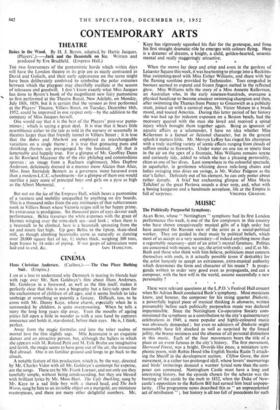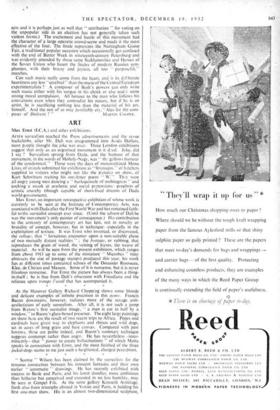MUSIC
The Politically Purposeful Symphony.
ALAN Buses, whose " Nottingham " symphony had its first London performance this week, is one of the few composers in this country who have shown unequivocally musical gifts, of a high order but have accepted the Russian view of the artist as a social-political worker. They are guided in their music by political beliefs, which most of us accept as a very secondary—if indeed anything more than a regrettably necessary—part of an artist's mental furniture. Politics are concerned with means, we say, the artist with ends ; and if; as Mr. Bush and those who think with him believe, politicians must concern themselves with ends, is it actually possible (even if desirable) for the artist honestly to accept an extraneous, extra-musical authority which determines the form and character of his music ? Is propa- ganda written to older very good even as propaganda, and can a composer, with the best will in the world, assume successfully a new personality ?
• *
These were relevant questions at the L.P.O.'s Festival Hall concert when Sir Adrian Boult conducted Bush's symphony. Most musicians know, and honour, the composer for his string quartet Dialectic, a po-Werfully logical piece of musical thinking in abstracto, written presumably before such politically purposeless music was declared impermissible. Since the Nottingham Co-operative Society com- missioned the symphony as a contribution to the city's quincentenary celebrations in 1949, a more popular and highly-coloured music was obviously demanded ; but even so adMirers of Dialectic might reasonably have felt shocked as well as surprised by the forced jollity, the brassy noisiness and the absence of all personal distinction in this music. Each of the four movements bears the title of a place or an event famous in the city's history. The first movement, Sherwood Forest, was a bright, Dvorak-like piece, a miniature sym- phonic poem, with Robin Hood (the English Stenka Razin ?) attack- ing the Sheriff in the development section. Clifton Grove, the slow movement, is a rather too prolonged idyll, whose lovers' murmurings and birds' twitterings demand a warmer lyrical note than the com- poser can command. Nottingham Castle must have a long and interesting history, but the episode chosen for the scherzo was the burning of the castle by the mob in 1832, when the Duke of New- castle's opposition to the Reform Bill had earned him local unpopu- larity. (The programme notes described this as " an unprecedented act of retribution " ; but history is all too full of precedents for such
acts and it is perhaps just as well that " retribution " for voting on the unpopular side in an election has not generally taken such violent forms.) The excitement and bustle of this movement had the character of a large operatic crowd-scene and made it the most effective of the four. The finale represents the Nottingham Goose Fair, a traditional popular occasion which occasionally got confused with the end of Butter Week in nineteenth-century Petersburg-and was evidently attended by those same Stakhanovites and Heroes of the Soviet Union who haunt the finales of modern Russian sym- phonies, with their brassy and joyless, all too " purposeful," marches.
Can such music really come from the heart, and is its deliberate heartiness any less "cerebral" than the music of the Central European experimentalists ? A composer of Bush's powers can only write such music either with his tongue in his cheek or else under some strong moral compulsion. All honour to the man who follows his convictions even when they contradict his nature, but if he is an artist, he is sacrificing nothing less than the material of his art, himself. And the rest of us may justifiably cry, "Alas for the com-



































 Previous page
Previous page